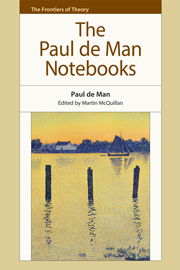Book contents
- Frontmatter
- Contents
- Series Editor's Preface
- Acknowledgements
- Dedication
- Introduction: ‘The Unimaginable Touch of Time’: The Public and Private in the Notebooks of Paul de Man
- PART I Texts
- 1 The Drawings of Paul Valéry (1948)
- 2 Jacques Villon (1952)
- 3 Graduate Essay on Keats (1954)
- 4 Postdoctoral Essay on Symbolism (c. 1960)
- 5 Introduction to Madame Bovary (1965)
- 6 Introduction to The Portable Rousseau (1973)
- 7 On Reading Rousseau (1977)
- 8 Translator's Introduction to “Rousseau and English Romanticism” (1978)
- 9 Rousseau and English Romanticism (1978)
- 10 Introduction to Studies in Romanticism (1979)
- 11 Hommage à Georges Poulet (1982)
- 12 A Letter from Paul de Man (1982)
- 13 Reply to Raymond Geuss (1983)
- 14 Interview with Robert Moynihan (1984)
- PART II Translations
- PART III Teaching
- PART IV Research
- Appendix. The Notebooks of Paul de Man 1963–83
- Bibliography
- Index of Names
13 - Reply to Raymond Geuss (1983)
from PART I - Texts
Published online by Cambridge University Press: 05 December 2014
- Frontmatter
- Contents
- Series Editor's Preface
- Acknowledgements
- Dedication
- Introduction: ‘The Unimaginable Touch of Time’: The Public and Private in the Notebooks of Paul de Man
- PART I Texts
- 1 The Drawings of Paul Valéry (1948)
- 2 Jacques Villon (1952)
- 3 Graduate Essay on Keats (1954)
- 4 Postdoctoral Essay on Symbolism (c. 1960)
- 5 Introduction to Madame Bovary (1965)
- 6 Introduction to The Portable Rousseau (1973)
- 7 On Reading Rousseau (1977)
- 8 Translator's Introduction to “Rousseau and English Romanticism” (1978)
- 9 Rousseau and English Romanticism (1978)
- 10 Introduction to Studies in Romanticism (1979)
- 11 Hommage à Georges Poulet (1982)
- 12 A Letter from Paul de Man (1982)
- 13 Reply to Raymond Geuss (1983)
- 14 Interview with Robert Moynihan (1984)
- PART II Translations
- PART III Teaching
- PART IV Research
- Appendix. The Notebooks of Paul de Man 1963–83
- Bibliography
- Index of Names
Summary
The tenuous relationships between the disciplines of philosophy and literary theory have recently been strengthened by a development which, at least in this country and over the last fifty years, is somewhat unusual. Literary theorists never dispensed with a certain amount of philosophical readings and references, but this does not mean that there always was an active engagement between the two institutionalized academic fields. Students of philosophy, on the other hand, can legitimately and easily do without the critical investigation of literary theorists, past or present; it is certainly more important for a literary theorist to read Wittgenstein than for a philosopher to read I. A. Richards, say, or Kenneth Burke. But the situation has become somewhat more mobile. Several members of the philosophical profession have prominently taken part in literary conferences, including the yearly meetings of the Modern Language Association, and some literary theorists have been present in person or have been represented by their writings at gatherings organized by philosophers. It would certainly be an exaggeration to speak of an active, lively dialogue between them; yet symptoms of a renewed interest are discernible on both sides. Since many problems, technical as well as substantial, are shared by both fields, such a trend can only be salutary. It may not only prevent duplications but also renew the approach to recurrent questions by the shock of unfamiliar, perhaps even incongruous, perspectives.
- Type
- Chapter
- Information
- The Paul de Man Notebooks , pp. 139 - 146Publisher: Edinburgh University PressPrint publication year: 2014

